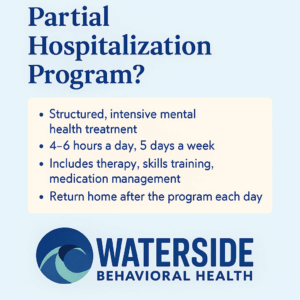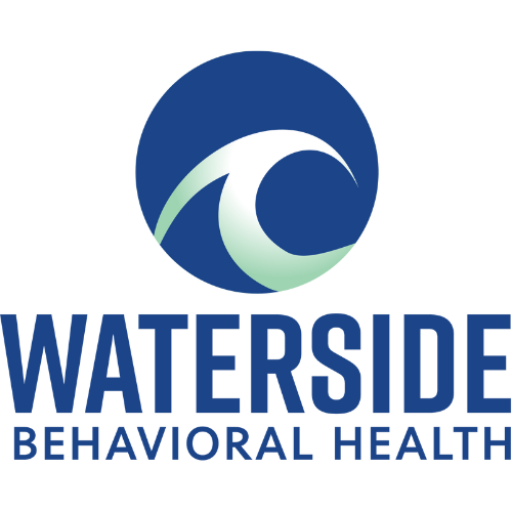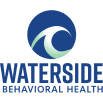Even when you’ve been living on high alert, there’s a moment of pause when your child says they’re ready for more help.
It can feel like a knot loosening—then tightening again just as quickly. Relief that they see the need. Worry about what’s ahead. Guilt about what’s already happened.
A Partial Hospitalization Program (PHP) can sound clinical or even intimidating if you’ve never heard of it. But in many cases, it’s a sign that your loved one is taking a meaningful step toward stability—without the intensity of a full hospital stay.
If your young adult is considering a PHP, here’s what it means, why it might be appealing to them, and how it can offer real hope for change. You can also learn more about our Partial Hospitalization Program in Massachusetts here.
What Is a Partial Hospitalization Program?
A Partial Hospitalization Program is a structured, intensive mental health treatment option that offers many of the same benefits as inpatient care—without the requirement to stay overnight.
- Schedule: Usually runs 5 days a week, for 4–6 hours each day.
- Services: Includes individual therapy, group sessions, skills training, and medication management if needed.
- Setting: A clinical or treatment center environment, but not a locked hospital unit.
- Goal: To help participants stabilize symptoms, learn coping tools, and strengthen daily functioning.
In a PHP, your child is surrounded by trained professionals while still returning home in the evenings. This means they can maintain important connections to family, friends, and familiar surroundings—often making it easier to apply what they learn.
Why a Young Adult Might Prefer PHP Over Other Options
Many parents wonder, Why not just keep going to therapy? or Why not inpatient care if things are serious? The answer often comes down to balance and agency.
Young adults may feel that weekly therapy isn’t enough, but inpatient hospitalization feels too restrictive. PHP offers:
- More structure than outpatient therapy — daily sessions keep momentum going.
- More independence than inpatient care — they still get to sleep in their own bed.
- A choice in treatment — having some control over where and how they get help can increase buy-in.
Sometimes, choosing PHP is less about avoiding a higher level of care and more about feeling ready to take ownership of their mental health—while still having strong professional support.
What a Typical Day Looks Like in PHP
While each program is different, here’s what your child might experience:
Morning Check-In
They start the day by meeting with staff or peers to set personal goals, share any updates, and prepare mentally for the day’s work.
Therapy Groups
These are guided by licensed therapists and might cover:
- Cognitive Behavioral Therapy (CBT) skills
- Dialectical Behavior Therapy (DBT) strategies
- Mindfulness and stress reduction techniques
Individual Sessions
One-on-one time with a therapist to address personal challenges, track progress, and adjust treatment goals.
Skills Classes
Practical workshops like emotional regulation, communication strategies, or problem-solving exercises.
Lunch Break
A short mid-day break to rest, eat, and connect informally with others in the program.
Afternoon Wrap-Up
A closing group or individual check-out to reflect on the day and set intentions for the evening.

How PHP Supports Family Connection
One of the biggest misunderstandings about mental health treatment is that it’s only about the individual. In reality, family involvement can be a powerful part of recovery—and many PHPs recognize this.
At Waterside Behavioral Health, family involvement may include:
- Family therapy sessions to improve communication and rebuild trust.
- Education on mental health conditions so you can better understand what your loved one is facing.
- Guidance on boundaries and support strategies to help you protect your own well-being while showing up for your child.
These moments aren’t about blame—they’re about building a shared language for what’s happening and how to move forward together.
PHP in Plymouth County: Access and Local Relevance
Location matters more than most families realize. If you’re looking for a Partial Hospitalization Program in Plymouth County, MA, choosing a nearby option means:
- Less time commuting, more time resting and practicing skills at home.
- A smoother transition to local outpatient therapy or community supports afterward.
- Familiar surroundings, which can help reduce the stress of entering treatment.
Signs PHP Might Be the Right Next Step
While every situation is unique, here are some common indicators:
- Outpatient therapy hasn’t been enough to create lasting change.
- Symptoms are disrupting daily life—work, school, relationships.
- Your child is motivated to get help but fears losing all independence.
- There’s a need for more structured support, but not 24-hour monitoring.
- They’ve recently been discharged from inpatient care and need a bridge to outpatient services.
FAQ: Partial Hospitalization Program for Young Adults
1. Is PHP only for severe mental health conditions?
No. PHP can be for moderate to severe symptoms that need more than outpatient therapy but don’t require inpatient hospitalization.
2. Will my child still be able to work or go to school?
Possibly, but the daytime schedule can be demanding. Many participants pause work or classes temporarily to focus on recovery.
3. How is PHP different from Intensive Outpatient Programs (IOP)?
PHP usually has longer daily sessions and more frequent attendance than IOP, making it a step up in intensity.
4. Does insurance cover PHP?
In many cases, yes—especially if recommended by a clinician. Waterside Behavioral Health can help check your benefits.
5. Will I be involved in my child’s treatment?
Often, yes. Family participation is encouraged, though the level of involvement depends on your child’s consent and the program’s structure.
Final Thought for Parents
If your child is considering PHP, it doesn’t mean you’ve failed as a parent. It means they’re willing to step into a structured, supportive space where change is possible. You can stand alongside them in that step—not as the fixer, but as someone who believes stability is possible.
Ready to Talk?
Call 774-619-7750 or visit our Partial Hospitalization Program services in Plymouth County, MA to learn how Waterside Behavioral Health can support your family.




